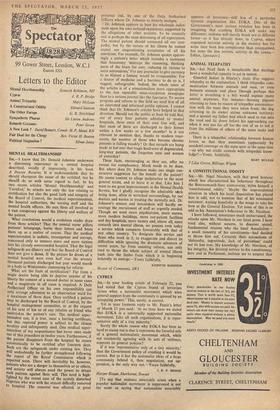Letters to the Editor
Mental Healthmanship Kenneth Robinson, MP Cyprus J. R. P. Bridge Animal Telepathy Mary McLean A Constitutional Oddity Edward Samson The Other Europe G. R. Strickland Sympathetic Pharos Sir Linton Andrews Kenneth Grahame Peter Green A New Look ? David Bennett, Comdr. H. P. Mead, RN Fair Deal for the Clergy Rev. Victor H. Beaton Political Stagnation ? Silvan Jones
MENTAL HEALTHMANSHIP
SIR,—I know that Dr. Donald Johnson underwent a distressing experience in a mental hospital described, vividly if imprecisely, in his book A Doctor Returns. It is understandable that he should champion the cause of the certified, but he shoula do so with some regard to fact. In his two recent articles 'Mental Healthmanship' and 'Certified,' he attacks not only the law relating to certification but also the good faith and integrity of the Board of Control, the medical superintendents, the hospital authorities, the nursing staff and the mental health officers. He sees them all involved in a vast conspiracy against the liberty and welfare of the patient.
What conclusions would a credulous reader draw from these articles? That the mental nurse pilfers patients' belongings, burns their letters and beats them up as a matter of course. That the medical superintendent is sadistic, incompetent and corrupt, concerned only to ensnare more and more victims into his already overcrowded hospital. That the legal safeguards are illusory and that the Board of Control does not give a damn. If the picture he draws of a mental hospital were even half true the seventy thousand patients discharged last year would march in a body to Westminster clamouring for reform.
What are the facts of certification? Far from a single doctor being able to deprive anyone of his liberty the consent of a second doctor in some cases and a magistrate in all cases is required. A Duly Authorised Officer on his own responsibility can only arrange admission to an observation ward for a maximum of three days. Once certified a patient may be .discharged by the Board of Control, by the hospital management committee, or at the request of his next of kin or of any relative or friend who undertakes the patient's care. The medical super- intendent can, it is true, issue a barring certificate, but this reserved power is subject to the closest scrutiny and infrequently used. One medical super- intendent of my acquaintance has never once made use of this procedure in twelve years. Furthermore, if the patient disappears from the hospital he ceases automatically to be certified after fourteen days. Such are the safeguards under existing law. They will undoubtedly be further strengthened following the report of the Royal Commission which is expected soon. There will inevitably be, however, patients who are a danger to themselves or to others, and society will always need the power to detain such patients against their will. This need is high- lighted by the recent case of the acutely disturbed Nigerian who was with the utmost difficulty removed to hospital. The removal was effected, at great personal risk, by one of the Duly Authorised Officers whom Dr. Johnson so bitterly maligns.
Dr. Johnson appears to base his wholesale indict- ment upon his own isolated experience, supported by the allegations of other patients. To be mentally sick is perhaps the most distressing of all experiences. The mental patient should command all our sym- pathy, but by the nature of his illness he cannot expect our unquestioning acceptance of all his assertions. For example, Dr. Johnson quotes approv- ingly a patient's letter which includes a statement that leucotomy 'destroys the reasoning, thinking parts of the brain for ever, reducing its victims to mere automatons.' For any journalist to give currency to so blatant a fantasy would be irresponsible. For a doctor of medicine and a barrister to do so is, I suggest, unforgivable. Indeed, the whole tenor of the articles is of a sensationalism more appropriate to the less reputable mass-circulation newspaper than to a serious journal like the Spectator. To secure progress and reform in this field we need first of all an interested and informed public opinion. I cannot think that Dr. Johnson's articles have helped in that direction. Should not the public at least be told that, out of every four patients admitted to mental hospitals, three enter of their own free will, and that most of them are discharged to their homes within a few weeks or a few months? Is it not relevant to mention that, thanks to modern treat- ments, the number of those who become chronic patients is falling steadily? Or that inroads are being made at last into that tragic hard-core of degenerated, long-stay patients, the forgotten men and women of yesterday?
These facts, encouraging as they are, offer no excuse for complacency. Much needs to be done. But where does Dr. Johnson make one single con- structive suggestion for the benefit of the patient? He seems content to allege malpractice in the most general terms, and to leave it at that. Like him I want to see great improvements in the Mental Health Service, but I gladly recognise the admirable wsork being done, often in wretched surroundings, by our doctors and nurses in treating the mentally sick. Dr. Johnson's smears and innuendoes will hardly en- courage the recruitment of staff so urgently needed. Though we need more psychiatrists, more nurses, more modern buildings, more out-patient facilities and day hospitals, more money and, above all, more research into mental illness, we possess even today a service which compares favourably with that of any other country. To denigrate this service and those who work in it, to exaggerate and distort its difficulties while ignoring the dramatic advances of recent years, far from assisting reform, can only tend to thrust the whole subject of mental illness back into the limbo from which it is beginning belatedly to emerge.—Yours faithfully, House of Commons, SW1
KENNETH ROBINSON


































 Previous page
Previous page